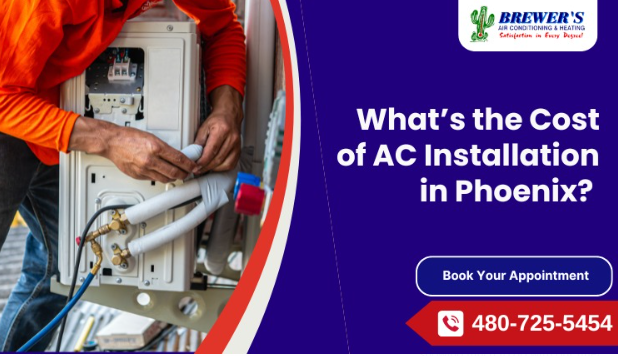
Should you opt for an HVAC system repair or replace the system? This is a tough question many homeowners face.
Fixing the system is cheaper than replacing it. It can also keep the heating and cooling working for a bit longer. But a new system can save you money on your energy bills every month. Plus, you’ll have peace of mind knowing the new system won’t break down anytime soon.
This guide will help you decide whether to repair or replace the HVAC system.
When to Fix Your HVAC System
Many homeowners panic when their heating and cooling system breaks down. But often, a simple HVAC repair in Mesa can get the system working again. Here are some tips to help you decide when to fix the system:
- Age of the system: HVAC systems, like all machines, don’t last forever. The age of the system is a good starting point to decide if you should fix or replace it. Many things can affect how long a system lasts, such as how often you use it, how well you take care of it, and the climate you live in. But here’s a general idea of how long HVAC systems last:
- Air conditioners: 15-20 years
- Furnaces: 15-20 years
- Heat pumps: 15 years
- If the system is less than 15 years old, you should probably consider fixing it if it breaks down.
- Warranty: If the system is still under warranty, the warranty should cover the cost of repairs. But if the warranty is gone, you’ll have to pay for the repairs yourself. Replacing the system might be a better option if it’s old, not very efficient, or breaks down frequently.
- Cost of repairs: The cost of HVAC system repairs is a significant factor to consider when deciding to replace the system. Many HVAC technicians in Mesa use a simple rule to help you decide. Just multiply the age of the system by the cost of the repair. If the answer is less than $5,000, then fixing the system might be a good option. If the answer is more than $5,000, then replacing the system might be a better choice.
Here are some repairs that might mean it’s time to replace the air conditioner, especially if it’s not under warranty anymore:
- Replacing the evaporator coil
- Replacing the compressor
- Replacing the condenser fan motor
- Fixing a refrigerant leak
Repairs add up over time. If you’re always calling the best HVAC company to fix the system, it might be time to buy a new, energy-efficient system. One or two repairs in three years might mean the system is still worth fixing. But, three or more repairs in that time frame probably means the HVAC system is losing efficiency and may be close to breaking down for good. In that case, replacing the system is the better option.
When to Replace the HVAC System
There are a few reasons why you might decide to replace the heating and cooling system, even if it’s not broken down yet.
System Efficiency
How efficient the system is should also be a significant factor in your decision to fix or replace it. Older systems are not very efficient for two reasons. First, they lose efficiency over time as they wear out. Second, systems made even ten years ago are far less efficient than today’s energy-efficient models. If you want to save money on the energy bills, consider replacing your system.
Air Conditioners: The efficiency of an air conditioner is measured by its SEER rating. New air conditioners must have a SEER of at least 14 in some states and 15 in others. If the old air conditioner has a SEER rating below 10, you should consider replacing it. Replacing a SEER 9 air conditioner with a SEER 14 air conditioner can save you more than 35% on energy costs. Some air conditioners can be as efficient as SEER 26 but will cost more money.
Furnaces: The efficiency of a furnace is measured by its AFUE rating. Gas furnaces with an AFUE of 95% or higher in cold climates and 90% or higher in warm climates are considered Energy Star certified. If the furnace has an AFUE rating of 80% or higher, then fixing it might be a good option. If the rating is lower than 80%, replacing it might be a better choice.
Other Factors to Consider
Financial Incentives
The government sometimes offers tax credits or rebates to help you buy a new, energy-efficient heating and cooling system. This can make buying a new system more attractive than fixing the old one. For instance, there are tax credits available right now for heat pumps.
Moving Plans
Replacing your HVAC system is a big investment. If you plan on moving in the next few years, it might not make sense to replace it unless it breaks down completely or becomes a safety hazard. But, if you plan on staying in the same home for a while, a new energy-efficient system can save you money on the bills and keep your home comfortable for years.
Environment
If you’re concerned about the environment, replacing the old system might be a good option, especially if it’s around 10-15 years old. New furnaces and air conditioners are much more efficient, which means they’ll use less energy and lower your carbon footprint. Heat pumps can also be a good option because they use electricity and refrigerant to move heat instead of relying on fossil fuels.
Conclusion
Deciding whether to repair or replace the HVAC system depends on a number of factors. Talk to an expert HVAC repair service in Mesa and then take the call. Consider all of these factors to make the best decision for your home and your wallet.











